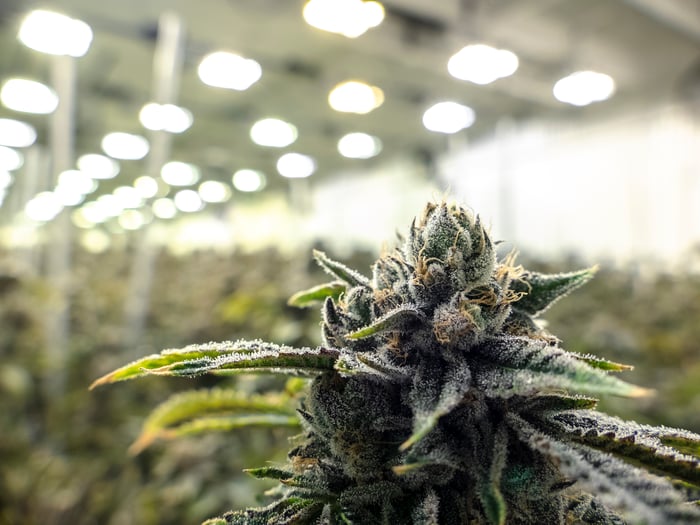Following a blazing-hot first quarter of 2019 that saw over a dozen marijuana stocks soar more than 70%, the past 11 months have been nothing short of awful. Persistent supply shortages or bottlenecks throughout Canada, huge pricing gaps between legal and illicit weed in the U.S., and a resilient black market throughout North America, are making life difficult for cannabis stocks.
And just when investors thought it couldn't possibly get any worse, the stock market entered into its swiftest correction in history this past week. All three major U.S. indexes wound up declining by a double-digit percentage, ultimately making for the worst week for equities since October 2008.
What do you get when you combine panic on Wall Street with an already beaten-down and still-unproven industry? The answer is a lot of downside potential.
When February came to a close, every single pure-play pot stock I follow, save for four, ended the month lower by at least 10%, if not considerably more. One of the four remaining pure-plays wound up declining by a more modest 7%, but nevertheless ended in the red. This left just three pure-play marijuana stocks that bucked the industry and market weakness and ended February in the green.

Image source: Getty Images.
Innovative Industrial Properties
Although it wound up retracing with the market the final week of February, cannabis-focused real estate investment trust (REIT) Innovative Industrial Properties (IIPR -0.17%) ended the month higher by 2.7%.
One of the key reasons Innovative Industrial Properties was able to buck the industrywide weakness it the relative predictability of its business model. As a REIT, IIP, as the company is better known, acquires medical marijuana cultivation and processing sites and leases them out for periods ranging between 10 and 20 years. This allows the company to reap the rewards of rental income, while also passing along annual rental increases to stay ahead of the inflationary curve. With reasonably low (and predictable) operating costs, it's no surprise that IIP is already very profitable.
Having reported its fourth-quarter and full-year results last week, Innovative Industrial Properties has now invested $563.2 million in 51 properties spanning 15 states, and has earmarked another $117.5 million for property improvements. What's most important about these assets is that they have a weighted-average remaining lease length of 15.6 years and an average return of 13.3%. Translation: IIP is going to get a complete payback on its investments in about 5.5 years.
As the only pure-play pot stock to pay a dividend, Innovative Industrial Properties is quite the standout. Expect its expansive property portfolio to continue driving net operating income even higher.

Image source: Getty Images.
Sundial Growers
Believe it or not, the top-performing cannabis stock in February was licensed producer Sundial Growers (SNDL 3.08%), which gained 18.3% despite facing late-month downgrade and price-target reduction from Cowen Group. But while Innovative Industrial Properties has a laundry list of reasons why it deserved to be up in February, Sundial Growers is a total mystery.
The most logical guess I can offer is that Sundial ended the month higher due to calming investor nerves. You see, on Jan. 30, Sundial wound up announcing the departure of CEO Torsten Kuenzlen and Executive Chairman Ted Hellard. Even though executive turnover in the pot industry has been commonplace, it's always worrisome when a company whose share price has already been spiraling lower sees its top leaders leave unexpectedly. On the day of and following this announcement, Sundial's share price fell by 53%. Thus, February's 18% gain might simply be reflective of a leveling off of investor expectations with a new management team.
Yet in spite of its top-tier performance, Sundial Growers looks like a name investors will want to avoid for the foreseeable future. One reason is that supply bottlenecks in key markets, such as Ontario, are ongoing. There should be some relief by the second-half of 2020 with Ontario having already moved to a more traditional license review and vetting process. Nevertheless, the upswing from the launch of high-margin derivatives may be much slower than initially expected.
Sundial is also a company that's predominantly relied on selling cannabis wholesale to generate revenue. While effective at moving larger quantities of product, wholesale weed is already coming under serious pricing pressure and is generally low-margin. That makes Sundial Growers an easy stock to bypass for now.

Image source: Planet 13.
Planet 13 Holdings
Last, but not least, little-known vertically integrated multistate operator Planet 13 Holdings (PLNH.F 1.35%) ended February higher by 5.9%.
The reason you may not have heard about Planet 13 before is that it's not angling for the quantity game that so many other multistate operators have chosen to follow. Instead of opening as many dispensaries as possible in multiple markets, Planet 13 has focused entirely on the experience for cannabis enthusiasts and potential customers. Its SuperStore just west of the Las Vegas Strip in Nevada is the largest cannabis dispensary in the country. The building spans 112,000 square feet and houses retail space, a restaurant, an events center, and a consumer-facing processing center. It's a unique experience that hasn't been replicated by any other marijuana companies.
This unique experience appears to be paying off for Planet 13. This past month, the company reported that its average ticket size per paying customer was approximately $100 in January. That's up from $79 per ticket when the SuperStore opened in November 2018, and it led to revenue that was about 10% higher than in the seasonally slower months of November and December of 2019. Remember, Las Vegas is a major tourist attraction, and that allure drops significantly during the colder fall and winter months.
Planet 13 is also expanding. It looks to be on track to open a 40,000-square-foot store in Santa Ana, California, just minutes away from Disneyland, during the second-half of 2020. If the company can replicate the success of the SuperStore in other popular cannabis markets, significant share price appreciation may follow.





